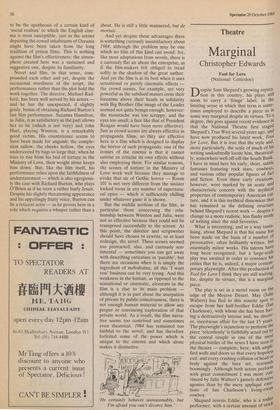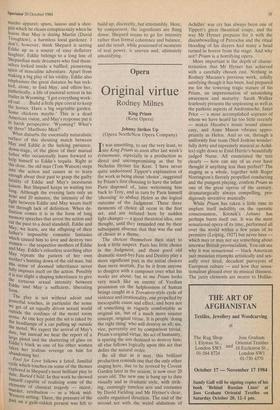Theatre
Marginal
Christopher Edwards
Fool for Love (National: Cottesloe)
Despite Sam Shepard's growing reputa- tion in this country, his plays still seem to carry a 'fringe' label, in the limiting sense in which that term is some- times employed to describe a piece as in some way marginal despite its virtues. Toa
i degree, this goes against recent evidence n
that the National Theatre first staged Shepard's True West several years ago, and have now produced his latest work, Fool for Love. But it is true that the style and, more particularly, the scale of much of his writing undoubtedly locate him, theatrical- ly, somewhere well off-off-the South Bank. I have in mind here his early, short, satiric fantasies featuring rock stars, cowboys, and various other popular figures of fact and fiction. Even these early creations, however, were marked by an acute and characteristic concern with the mythical properties of contemporary American cul- ture, and it is this mythical dimension that has remained as the defining structure behind Shepard's recent work — despite a change to a more realistic, less flashy mode of writing since the mid-Seventies.
What is interesting, and in a way tanta- lising, about Shepard is that his name has been made on the basis of a number of provocative, often brilliantly written, but essentially minor works. His talents have long been recognised, but a large-scale play was awaited in order to convince his critics that he is, indeed, a major contem- porary playwright. After this production of Fool for Love I think they are still waiting, for, despite its virtues, this is a marginal piece. The play is set in a motel room on the edge of the Mojave Desert. May (Jule Walters) has fled to this remote spot to escape from her half-brother Eddie (101 Charleson), with whom she has been hay" ing a destructively intense and, we discov- er, incestuous affair for the last 15 years' The playwright's injunction to perform the piece 'relentlessly' is faithfully acted out by the central couple in one of the most physical battles of the sexes I have seen to the theatre — complete, here, with arnPll" fied*walls and doors so that every hopeless exit; and every crashing collision of head or body against the bare set, resounds boomingly. Although both actors perform with great commitment I was more con- vinced by Julie Walters's gamely defensive agonies than by the mere appliqué exer- tions of Ian Charleson's living-room cowboy.
Shepard invests Eddie, who is a rodeo performer, with a certain amount of stock
macho apparel; spurs, lassoo and a shot- gun which he cleans conspicuously when he learns that May is dating Martin (David Troughton), a harmless local gardener. I don't, however, think Shepard is setting Eddie up as a source of easy deflatory laughter. Eddie belongs to a long line of Shepardian male dreamers who find them- selves locked inside a baffled, pioneering spirit of masculine adventure. Apart from making a big play of his virility, Eddie also emphasises the great distance he has trek- ked, alone, to find May, and offers her, pathetically, a life of pastoral retreat in his trailer in Wyoming: 'I got everything work- ed out • . . Build a little pipe corral to keep the horses. Have a big vegetable garden. Some chickens maybe.' This is a dead American vision, and May's response put it in harsh perspective: 'Wyoming? What's up there? Marlboro Men?'
What disturbs the essentially naturalistic surface of this shouting match between May and Eddie is the lurking presence, down-stage, of the ghost of their mutual father who occasionally leans forward to help himself to Eddie's tequila. Right at the close, the old man (Tom Watson) steps into the action and causes us to learn enough about their past to grasp the guilty fatality of Eddie and May's incestuous liaison. But Shepard keeps us waiting too I,°ag. Although the evening lasts only an hour and 20 minutes, the intensity of the fight between Eddie and May wears itself out through lack of definition. When de- finition comes it is in the form of long memory speeches that arrest the action and cut the pace to a dead standstill. Eddie and May, we learn, are the offspring of their father's impossible romantic fantasies which caused him to love and destroy two women — the respective mothers of Eddie and May. Eddie's relentless searching after May repeats the pattern of her own mother's hunting down of the old man, but this sense of doomed inheritance never fully imposes itself on the action. Possibly it is too slight a shaping inheritance to give the tortuous sexual intensity between Eddie and May a sufficient, liberating form.
The play is not without adroit and Powerful touches, in particular the sense We get of an equally driven sexual world outside the confines of the motel room arena. At one key point the set is raked by the headlamps of a car pulling up outside the motel. We expect the arrival of May's date, but instead we hear the report of a large pistol and the shattering of glass on Eddie's truck as one of his other women takes her jealous revenge on him for abandoning her. Fool for Love follows a fated, familial cycle which touches on some of the themes explored in Shepard's most brilliant play to date, Buried Child. In that work he showed himself capable of realising some of the elements of classical tragedy — incest, Murder, retribution — in a bleak mid- Western setting. There, the pressure of the Past on a guilt-ridden present was felt to
build up, discreetly, but irrestistibly. Here, by comparison, the ingredients are flung down; Shepard seems to go for intensity rather than formal coherence and balance, and the result, while possessed of moments of real power, is uneven and, ultimately unsatisfying.



















































 Previous page
Previous page